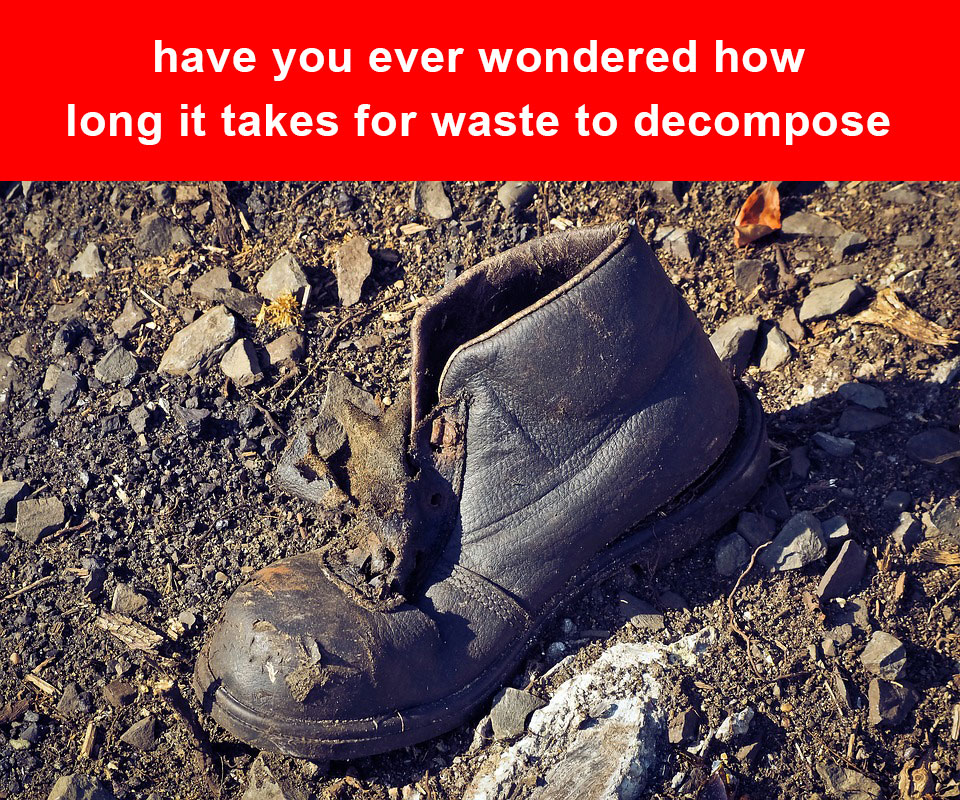Have you Ever Wondered How Long it Takes for Waste to Decompose

It’s no secret that different waste materials take different amounts of time to decompose. As a waste management company, we thought it’d be interesting to take a look at a range of common household products and their rate of decomposition. When left exposed to air and sunlight, this is how long it takes for these products to break down and be absorbed into the soil.
Loose-leaf paper
If you were to drop a single sheet of paper on the ground, it would take 2-4 weeks to be broken down and absorbed back into the environment.
Fruit and vegetable peels
Those pesky vegetable peels take approximately 5 weeks to fully break down and decompose, although some require significantly longer.
Cotton t-shirt
Any 100% cotton t-shirt tossed into a landfill exposed to air and sunlight has a decomposition time between one month and five months.
Orange peels
Remember when we say vegetable peels take up to 5 week to decompose – oranges are different. The average orange peel takes up to six months to decompose. Orange peels require more time than nearly all fruits and vegetables to break down.
Wool socks
A pair of wool socks will take up to 1 year to break down in the soil, when left exposed to air and sunlight.
Wool sweater
A little bit larger in size and thicker in composition, a wool sweater left outside will take up to 5 years to fully decompose.
Paper plate
Those disposable paper plates available from your local store, as it turns out, are quite environmentally problematic. A paper plate will also take up to 5 years to break down.
Plastic bags
Plastic bags can take up to 20 years to decompose and be absorbed back into our natural environment. This, in addition to being prone to being tangled in recycling sorting machines, is why so many stakeholders have come out advocating for a reduction in their use.
Painted wood
Toss a piece of painted wood in the garbage and, on average, it’ll take 13 years to fully decompose.
Plastic container
A plastic container requires up to 30 years to break down and be absorbed back into the environment.
Leather shoe
The average pair of leather shoes can take 40 years to decompose and break down, making them environmentally very expensive.
Rubber boot
Another favored selection of footwear, the classic rubber boot will take up to eighty years to decompose surprisingly.
Aluminum can
Thankfully, aluminum cans are highly recyclable. If they weren’t however, it would take them anywhere from 200 to 500 years to fully decompose.
Plastic 6-pack holder
When you buy a 6-pack of soda, you may see it contained in a plastic holder. For that plastic holder to decompose, it’ll take 450 years.
Disposable diapers
Sadly, disposable diapers are a huge environmental problem despite being a requirement for many parents across Canada. For a disposable diaper to break down and be absorbed back into nature, you’re looking at 500 years.
Glass bottle
The average glass bottle takes up to 1,000,000 years to fully decompose.
Plastic bottle
The average plastic bottle also takes up to 1,000,000 years to decompose.
These are just a few of the products ranging from easily degradable to near impossible. If you’re seeking waste management or recycling services in Toronto, speak with a Core Mini Bins representative today.


